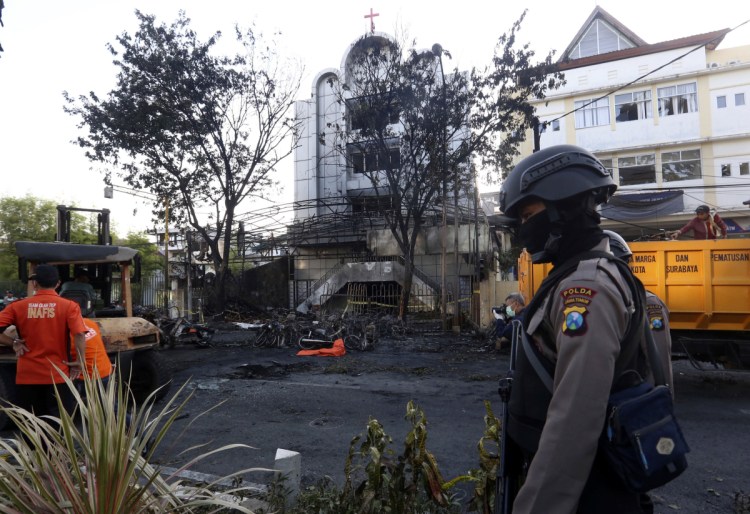SURABAYA, Indonesia — Coordinated suicide bombings carried out by members of the same family struck three churches in Indonesia’s second-largest city Sunday, police said, as the world’s most populous Muslim nation recoiled in horror at one of its worst attacks since the 2002 Bali bombings.
At least seven people died at the churches in Surabaya along with the six family members, the youngest of whom were girls ages 9 and 12, according to police. Another 41 people were injured.
Indonesia’s president condemned the attacks as “barbaric.”
National police chief Tito Karnavian said that the father detonated a car bomb, two sons ages 18 and 16 used a motorcycle for their attack, and the mother and her two daughters wore explosives.
Karnavian said the family had returned to Indonesia from Syria, where until recently the Islamic State controlled significant territory.
The Islamic State claimed responsibility for the attacks in a statement carried by its Aamaq news agency. It didn’t mention anything about families or children taking part and said there were only three attackers.
Indonesia’s deadliest terrorist attack occurred in 2002, when bombs exploded on the tourist island of Bali, killing 202 people in one night, mostly foreigners. But the fact that children were involved in Sunday’s attacks in Surabaya shocked and angered the country.
Jemaah Islamiyah, the network responsible for the Bali attacks, was obliterated by a sustained crackdown on militants by Indonesia’s counterterrorism police with U.S. and Australian support. A new threat has emerged in recent years, inspired by Islamic State attacks abroad.

People hold candles during a vigil for the victims of the church attacks in Surabaya, Indonesia, on Sunday. A coordinated suicide bomb attack carried out by members of the same family struck three churches Sunday, police said. Associated Press/Slamet Riyadi
Experts on militant networks have warned for several years that the estimated 1,100 Indonesians who traveled to Syria to join the Islamic State posed a threat if they returned home.
Karnavian identified the father as Dita Futrianto and said he was head of the Surabaya cell of Jemaah Anshorut Daulah, an Indonesian militant network affiliated with the Islamic State that has been implicated in attacks in Indonesia in the past year. He identified the mother as Puji Kuswati.
The attacks occurred within minutes of each other, according to Surabaya police spokesman Frans Barung Mangera.
Karnavian said Futrianto drove a bomb-laden car into the city’s Pentecostal church.
Kuswati, with her two daughters, attacked the Christian Church of Diponegoro, he said. Based on their remains, Karnavian said the mother and daughters were all wearing explosives around their waists.
The sons rode a motorcycle onto the grounds of the Santa Maria Church and detonated their explosives there.
A witness said the woman arrived at the Diponegoro church carrying two bags.
“At first officers blocked them in front of the churchyard, but the woman ignored them and forced her way inside. Suddenly, she hugged a civilian, then (the bomb) exploded,” said the witness, a security guard who identified himself as Antonius.
At Santa Maria, shattered glass and chunks of concrete littered the entrance, which was sealed off by armed police. Rescuers treated victims in a nearby field while officers inspected wrecked and burned motorcycles in the parking lot.
Copy the Story LinkSend questions/comments to the editors.



Success. Please wait for the page to reload. If the page does not reload within 5 seconds, please refresh the page.
Enter your email and password to access comments.
Hi, to comment on stories you must . This profile is in addition to your subscription and website login.
Already have a commenting profile? .
Invalid username/password.
Please check your email to confirm and complete your registration.
Only subscribers are eligible to post comments. Please subscribe or login first for digital access. Here’s why.
Use the form below to reset your password. When you've submitted your account email, we will send an email with a reset code.